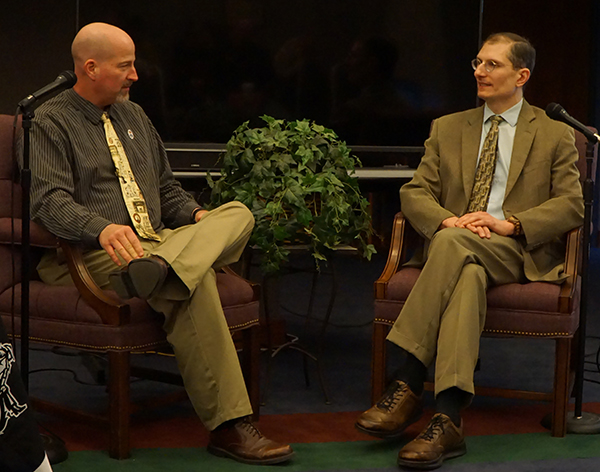By JORDAN GREEN, Editor-in-Chief

The Northwestern Institute for Citizenship Studies hosted a discussion of former presidents Zachary Taylor and Millard Fillmore on Tuesday in the Vinson Hall Alabaster Room.
Dr. Michael Cohen, a research professor in the Department of Government and a faculty fellow in the Center for Congressional and Presidential Studies at American University in Washington, D.C., came to Northwestern to talk about the legacies of the two presidents.
Cohen spoke at Northwestern in 2016 for the university’s presidential lecture series on former President James K. Polk. He has been an editor of projects publishing presidential letters.
A crowd of roughly two dozen students and university employees gathered for the discussion, the first since the coronavirus pandemic began.
Political science professors Drs. Aaron Mason and Eric Schmaltz organized the series, which aimed to highlight how the two presidents were “not as inconsequential as we might think,” Mason said.
Taylor, the 12th U.S. president, served from March 4, 1849, until he died in office on July 9, 1850. Fillmore, then the vice president, became president and served until 1853.
Taylor and Fillmore followed the Monroe Doctrine regarding foreign affairs, and they largely kept the United States out of revolutions in Europe, Cohen said.
The Tuesday discussion of the two presidents’ handling of European affairs came amid a heightened national debate over whether the United States should get involved in the war between Russia and Ukraine.
Cohen said that, although the political landscape is different today than it was in the 1800s, some similarities can be drawn between historical conflicts and present-day ones.
“They lived in, of course, a very different time in American foreign policy history,” Cohen said of the two presidents. “Back then, the U.S. was very isolationist in that sense with regard to Europe and did not like to get involved in European affairs.
“During and after World War II, the U.S. became much more a world power, one of the leading powers that wants to, and is expected to, have a role beyond its shores.
“One similarity is that belief in a moral connection, that people fighting against oppression in Europe or anywhere are fighting same battle the United States fought in 18th Century, and that some anti-slavery people saw them as fighting in the 19th Century – this fight for freedom.”
The presidents’ time in office was also marked by the passage of the Compromise of 1850, a series of legislative acts regarding the issue of slavery, Cohen said. Among them was the highly controversial Fugitive Slave Act, which required the government to return escaped slaves to their owners.
“Depending on how you look at it, the Compromise of 1850 that they both helped to bring about either caused the Civil War in the long term or postponed it for another decade,” Cohen said. “That really was their major legacy for the country.”
A video of the lecture will be posted on the university’s YouTube channel in the near future, Schmaltz said. Past lecture series videos are also available.
